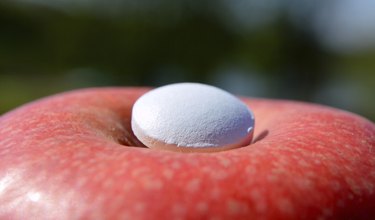
If you experience gastrointestinal, digestive or elimination problems, you may have considered taking probiotic or fiber supplements. Probiotics strains are similar to the natural bacteria in your gut and are sold as food or nutrition supplements. An increasing number of food suppliers market yogurt and specialty beverages as probiotics. Fiber supplements, which can help you pass stools, come in several forms, including powders, cereal bars and tablets.
Types of Probiotics and Fiber
Video of the Day
You've probably noticed a number of yogurt makers claiming their products have probiotics. In addition to dairy products, probiotics are in juices, capsules and liquids. The strains and concentration of bacteria in probiotic supplements vary from fewer than 1 billion to 50 billion units. Fiber supplements usually contain psyllium, bran or inulin. Psyllium fibers come from gel-like husks. Bran comes from grains, while plant-derived inulin is a polysaccharide.
Video of the Day
Probiotic and Fiber Benefits
Probiotics and fiber supplements are typically used to treat digestion and elimination problems. Probiotics can help balance your intestinal flora, the healthy bacteria in your intestines. Many people rely on probiotics if they take antibiotics, which can destroy gut bacteria. Fiber supplements can alleviate constipation and pass stools through your intestinal tract. They may also help with irritable bowel syndrome, hemorrhoids and diabetes.
Scientific Evidence
Probiotics can help alleviate diarrhea, irritable bowl syndrome and urinary tract infections. However, the National Center for Complementary and Alternative Medicine cautions that scientific evidence for their effectiveness is preliminary, weak and possibly attributable to the placebo effect. Greater clinical evidence supports fiber's effectiveness in treating a number of conditions. It can reduce constipation, diarrhea and cholesterol, among other problems, according the University of Maryland Medical Center.
Adding Them To Your Diet
There are many ways to consume probiotics. Various makers of yogurt and kefir, a fermented dairy product, market probiotic products that contain several bacteria strains. Most grocery stores sell probiotic capsules in the drug aisle. More concentrated versions, including liquid forms, may be found at higher-end grocery and nutrition shops. Fiber supplements include cereal and cereal bars, muffins, powdered mixtures and tablets.
Considerations
Although probiotics have few side effects, their safety has not been extensively studied, according to the National Institutes of Health. Common side effects include gas and bloating. Excessive fiber consumption can also cause these same problems. If you take fiber supplements, be sure to drink plenty of water, especially if you consume psyllium. Consult your health care provider before adding probiotics or fiber to your diet.